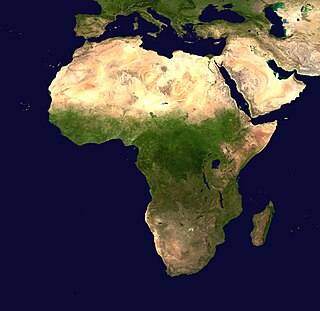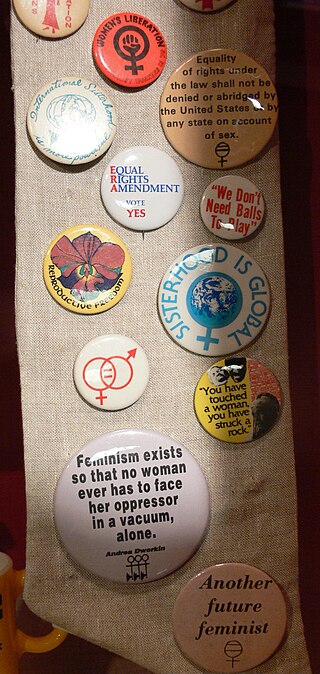Feminism is a range of socio-political movements and ideologies that aim to define and establish the political, economic, personal, and social equality of the sexes. Feminism holds the position that modern societies are patriarchal—they prioritize the male point of view—and that women are treated unjustly in these societies. Efforts to change this include fighting against gender stereotypes and improving educational, professional, and interpersonal opportunities and outcomes for women.
Gender studies is an interdisciplinary academic field devoted to analysing gender identity and gendered representation. Gender studies originated in the field of women's studies, concerning women, feminism, gender, and politics. The field now overlaps with queer studies and men's studies. Its rise to prominence, especially in Western universities after 1990, coincided with the rise of deconstruction.
Anarcha-feminism, also known as anarchist feminism or anarcho-feminism, is a system of analysis which combines the principles and power analysis of anarchist theory with feminism. It closely resembles intersectional feminism. Anarcha-feminism generally posits that patriarchy and traditional gender roles as manifestations of involuntary coercive hierarchy should be replaced by decentralized free association. Anarcha-feminists believe that the struggle against patriarchy is an essential part of class conflict and the anarchist struggle against the state and capitalism. In essence, the philosophy sees anarchist struggle as a necessary component of feminist struggle and vice versa. L. Susan Brown claims that "as anarchism is a political philosophy that opposes all relationships of power, it is inherently feminist".
Liberal feminism, also called mainstream feminism, is a main branch of feminism defined by its focus on achieving gender equality through political and legal reform within the framework of liberal democracy and informed by a human rights perspective. It is often considered culturally progressive and economically center-right to center-left. As the oldest of the "Big Three" schools of feminist thought, liberal feminism has its roots in 19th century first-wave feminism seeking recognition of women as equal citizens, focusing particularly on women's suffrage and access to education, the effort associated with 19th century liberalism and progressivism. Liberal feminism "works within the structure of mainstream society to integrate women into that structure." Liberal feminism places great emphasis on the public world, especially laws, political institutions, education and working life, and considers the denial of equal legal and political rights as the main obstacle to equality. As such liberal feminists have worked to bring women into the political mainstream. Liberal feminism is inclusive and socially progressive, while broadly supporting existing institutions of power in liberal democratic societies, and is associated with centrism and reformism. Liberal feminism tends to be adopted by white middle-class women who do not disagree with the current social structure; Zhang and Rios found that liberal feminism with its focus on equality is viewed as the dominant and "default" form of feminism. Liberal feminism actively supports men's involvement in feminism and both women and men have always been active participants in the movement; progressive men had an important role alongside women in the struggle for equal political rights since the movement was launched in the 19th century.
Marxist feminism is a philosophical variant of feminism that incorporates and extends Marxist theory. Marxist feminism analyzes the ways in which women are exploited through capitalism and the individual ownership of private property. According to Marxist feminists, women's liberation can only be achieved by dismantling the capitalist systems in which they contend much of women's labor is uncompensated. Marxist feminists extend traditional Marxist analysis by applying it to unpaid domestic labor and sex relations.

Feminist sociology is an interdisciplinary exploration of gender and power throughout society. Here, it uses conflict theory and theoretical perspectives to observe gender in its relation to power, both at the level of face-to-face interaction and reflexivity within social structures at large. Focuses include sexual orientation, race, economic status, and nationality.

Signs: Journal of Women in Culture and Society is a peer-reviewed feminist academic journal. It was established in 1975 by Jean W. Sacks, Head of the Journals Division, with Catharine R. Stimpson as its first editor-in-Chief, and is published quarterly by the University of Chicago Press. Signs publishes essays examining the lives of women, men, and non-binary people around the globe from both historical and contemporary perspectives, as well as theoretical and critical articles addressing processes of gendering, sexualization, and racialization.

Barbara Smith is an American lesbian feminist and socialist who has played a significant role in Black feminism in the United States. Since the early 1970s, she has been active as a scholar, activist, critic, lecturer, author, and publisher of Black feminist thought. She has also taught at numerous colleges and universities for 25 years. Smith's essays, reviews, articles, short stories and literary criticism have appeared in a range of publications, including The New York Times Book Review, The Black Scholar, Ms., Gay Community News, The Guardian, The Village Voice, Conditions and The Nation. She has a twin sister, Beverly Smith, who is also a lesbian feminist activist and writer.
Antifeminism, also spelled anti-feminism, is opposition to feminism. In the late 19th century and early 20th century, antifeminists opposed particular policy proposals for women's rights, such as the right to vote, educational opportunities, property rights, and access to birth control. In the mid and late 20th century, antifeminists often opposed the abortion-rights movement.
The men's movement is a social movement that emerged in the 1960s and 1970s, primarily in Western countries, which consists of groups and organizations of men and their allies who focus on gender issues and whose activities range from self-help and support to lobbying and activism.

Cynthia Holden Enloe is an American political theorist, feminist writer, and professor. She is best known for her work on gender and militarism and for her contributions to the field of feminist international relations. She has also influenced the field of feminist political geography, with feminist geopolitics in particular.
Amrita Basu is an American academic and political scientist. She currently is a professor at Amherst College where she holds affiliations in the departments of Political Science, Sexuality, Women's, & Gender Studies, Asian Languages & Civilizations, and Black Studies.
Feminism is a broad term given to works of those scholars who have sought to bring gender concerns into the academic study of international politics and who have used feminist theory and sometimes queer theory to better understand global politics and international relations as a whole.
Since the 19th century, men have taken part in significant cultural and political responses to feminism within each "wave" of the movement. This includes seeking to establish equal opportunities for women in a range of social relations, generally done through a "strategic leveraging" of male privilege. Feminist men have also argued alongside writers like bell hooks, however, that men's liberation from the socio-cultural constraints of sexism and gender roles is a necessary part of feminist activism and scholarship.

African feminism includes theories and movements which specifically address the experiences and needs of continental African women. From a western perspective, these theories and movements fall under the umbrella label of Feminism, but this categorization is misleading for many branches of African "feminism". African women have been engaged in gender struggle since long before the existence of the western-inspired label "African feminism," and this history is often neglected. Despite this caveat, this page will use the term feminism with regard to African theories and movements in order to fit into a relevant network of Wikipedia pages on global feminism. Because Africa is not a monolith, no single feminist theory or movement reflects the entire range of experiences African women have. African feminist theories are sometimes aligned, in dialogue, or in conflict with Black Feminism or African womanism. This page covers general principles of African feminism, several distinct theories, and a few examples of feminist movements and theories in various African countries.

A variety of movements of feminist ideology have developed over the years. They vary in goals, strategies, and affiliations. They often overlap, and some feminists identify themselves with several branches of feminist thought.
Feminist ethics is an approach to ethics that builds on the belief that traditionally ethical theorizing has undervalued and/or underappreciated women's moral experience, which is largely male-dominated, and it therefore chooses to reimagine ethics through a holistic feminist approach to transform it.
Shirin M. Rai, is an interdisciplinary scholar who works across the political science and international relations boundaries. She is known for her research on the intersections between international political economy, globalisation, post-colonial governance, institutions and processes of democratisation and gender regimes. She was a professor of politics and international studies at the University of Warwick, and is the founding director of Warwick Interdisciplinary Research Centre for International Development (WICID).

Ecofeminism integrates feminism and political ecology. Ecofeminist thinkers draw on the concept of gender to analyse relationships between humans and the natural world. The term was coined by the French writer Françoise d'Eaubonne in her book Le Féminisme ou la Mort (1974). Ecofeminist theory introduces a feminist perspective to Green politics and calls for an egalitarian, collaborative society in which there is no one dominant group. Today, there are several branches of ecofeminism, with varying approaches and analyses, including liberal ecofeminism, spiritual/cultural ecofeminism, and social/socialist ecofeminism. Interpretations of ecofeminism and how it might be applied to social thought include ecofeminist art, social justice and political philosophy, religion, economics, contemporary feminism, and literature.
Multiracial feminist theory refers to scholarship written by women of color (WOC) that became prominent during the second-wave feminist movement. This body of scholarship "does not offer a singular or unified feminism but a body of knowledge situating women and men in multiple systems of domination."






